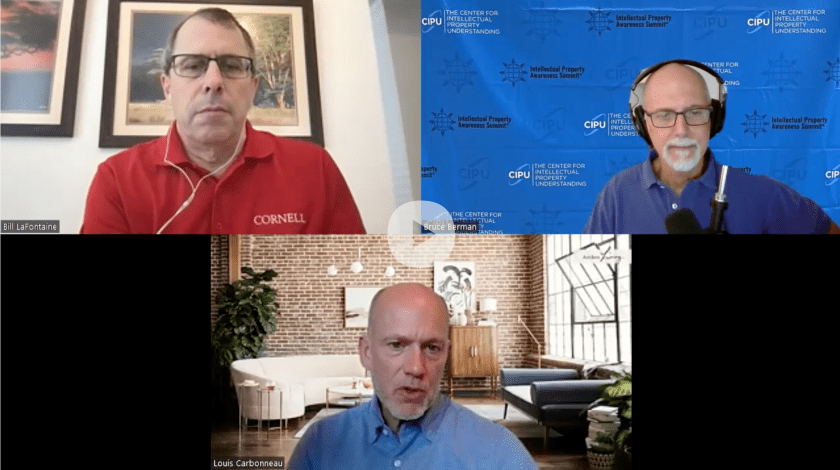Generating a return on tech patents from licensing without suing for infringement is fast becoming a lost art – even if the licensor is a tech giant.
Once an income generator for large companies and independent inventors alike, patent licensing has fallen victim to over-correction in the Congress and the Courts. The impact is only just beginning to be felt.
A decade ago technology companies like Microsoft and IBM signed hundreds of mutually beneficial licensing agreements with a wide range of businesses without having to sue.
What happened to change the relationship between the patent haves and have nots? What does it mean for innovation and commerce?
IP monetization experts Louis Carbonneau,CEO of Tangible IP and a respected observer of the patent marketplace, and Bill LaFontaine, recently retired head of IP strategy at IBM are Bruce Berman’s guests on the latest episode of “Understanding IP Matters,” which dropped this week.
Louis Carbonneau is the former general manager of IP licensing at Microsoft. Today, he works with patent sellers and patent buyers as founder of patent brokerage firm Tangible IP. He is a venture partner and strategic advisor to Cycle Capital Management as well as an inventor himself.
William LaFontaine recently retired from IBM after a 33-year career, serving most recently as general manager of IP and vice president for research, business, and development. He and his team worked with research business units and clients to accelerate market introduction of new technologies, including AI, quantum computing, and healthcare.
Sample Questions
Without violating any confidences, who are the patent sellers and buyers these days and what are they looking for?
Louis Carbonneau: “Buyers are looking for the perfect patent and sellers are looking for the perfect buyers and they rarely meet in the middle. They are like ships passing each other at night, because there’s no such thing as a perfect patent.
“The legal environment has deteriorated when it comes to patent rights. It’s fairly hard nowadays to find a patent that you can guarantee will be deemed valid after being challenged and will be ruled infringed after you basically went through the gauntlet of challenges that are available to defendants, whether it’s the PTAB or in court where you litigate it.”
Bill LaFontaine: “From an IBM perspective, the patents are the core of the revenue stream. They infuse everything you do….
In semiconductors, we partner with companies in Albany, New York in a research center there. It’s what we do with the state of New York. Having a pilot line there solves multiple problems for us. It’s a question of, how do we accelerate innovation, because we want the leading edge for our big machines. And two, the cost of development is wickedly high. Why should we not share that? Three is, for many of the people we partner with, they have a different business model than us. So, there’s no conflict in how the IP gets deployed.
[Building these open innovation partnerships] sounds easy to do, but is much more difficult in practice to execute. [IBM] has been at it for many decades. It takes set of skills and and relationships that are hard to replicate.”
Key Factors
Among the factors Carbonneau and LaFontaine consider:
- The Internet culture
- Unwillingness to pay for intangibles
- The America Invents Act and PTAB
- Supreme Court decisions
- Consolidation of the tech industry
- The nature of software innovation
Go here to listen to the episode, or to listen to interviews from season one, two or three.
Image source: CIPU

